Key takeaways:
- Vaccine misinformation, often amplified by social media and personal anecdotes, can overshadow scientific evidence, leading to public hesitancy and health risks.
- Accurate vaccine information is vital to combat fear-based narratives and encourage informed health choices in communities.
- Common myths, such as vaccines causing diseases or containing harmful substances, persist despite evidence showing their safety and effectiveness.
- Conversations about vaccines should be approached with empathy, addressing fears while providing reliable information to counter misinformation.
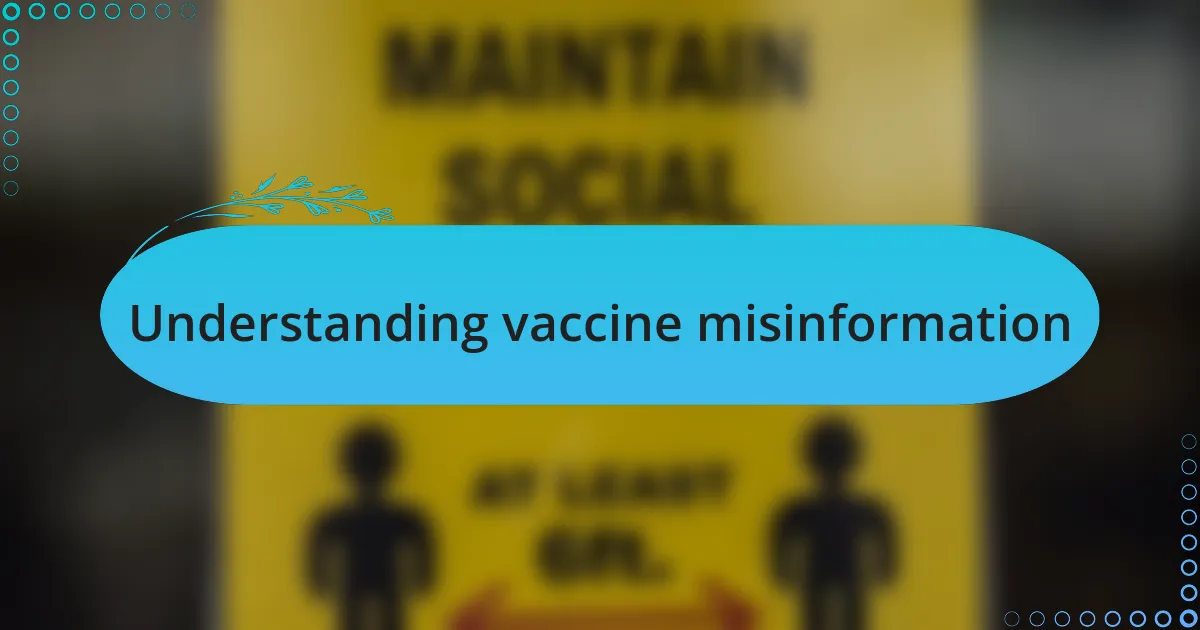
Understanding vaccine misinformation
Vaccine misinformation can spread rapidly, especially on social media, where sensational stories often outperform factual information. I recall scrolling through my feed and coming across a post claiming vaccines contained microchips. It struck me how easy it is for people to believe such outrageous claims when they resonate with their fears.
Understanding this phenomenon involves recognizing the emotions behind vaccine hesitancy. Many individuals feel anxious about their health and the unknown, prompting them to latch onto alternative narratives. Have you ever found yourself doubting a widely accepted fact because of a compelling story shared by a friend? This emotional connection can cloud judgment, making it essential for us to address these fears with empathy and clear information.
It’s fascinating to consider that people often trust personal stories over statistics. I remember discussing vaccine influences with a colleague, who shared their own story of side effects from a vaccine years ago. Hearing personal experiences like this can lead individuals to dismiss the broader evidence, highlighting the need for patient, informative dialogues that validate their concerns while steering them back towards reliable information.
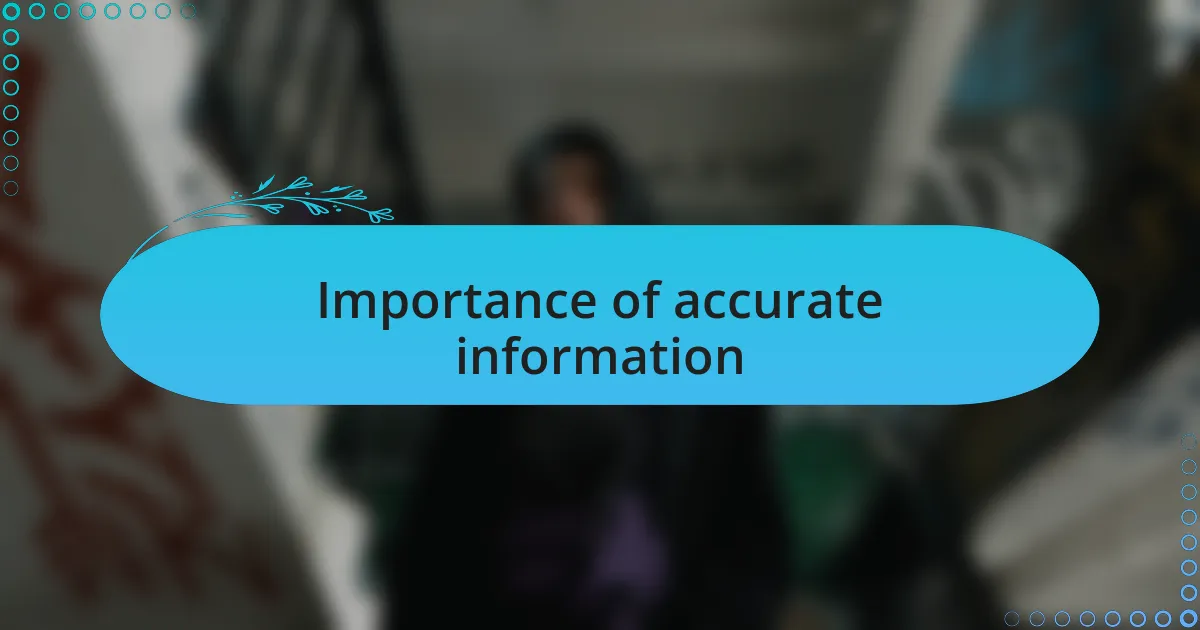
Importance of accurate information
Accurate information about vaccines is crucial for public health. I remember a time when a close friend expressed her apprehension about getting vaccinated, citing a viral video that made unsubstantiated claims. This situation reminded me that, without access to factual and credible sources, even the most rational individuals can be swayed by fear rather than evidence.
When I think about misinformation, it often feels like a ripple effect. One misinformed individual can influence their circle, leading to increased hesitancy within communities. Have you ever seen how quickly rumors can multiply in a group chat? This highlights the urgent need for accurate information to counteract that initial spark of doubt, helping to foster educated conversations rather than fear-based panic.
The importance of accuracy cannot be overstated, as misinformation can lead to real-world consequences. For instance, I once came across a community forum where individuals were debating whether to vaccinate their children based on unfounded theories. It was disheartening to see parents caught in a web of misinformation instead of relying on trusted health authorities. When reliable information becomes accessible and engaging, it empowers everyone to make informed choices about their health.
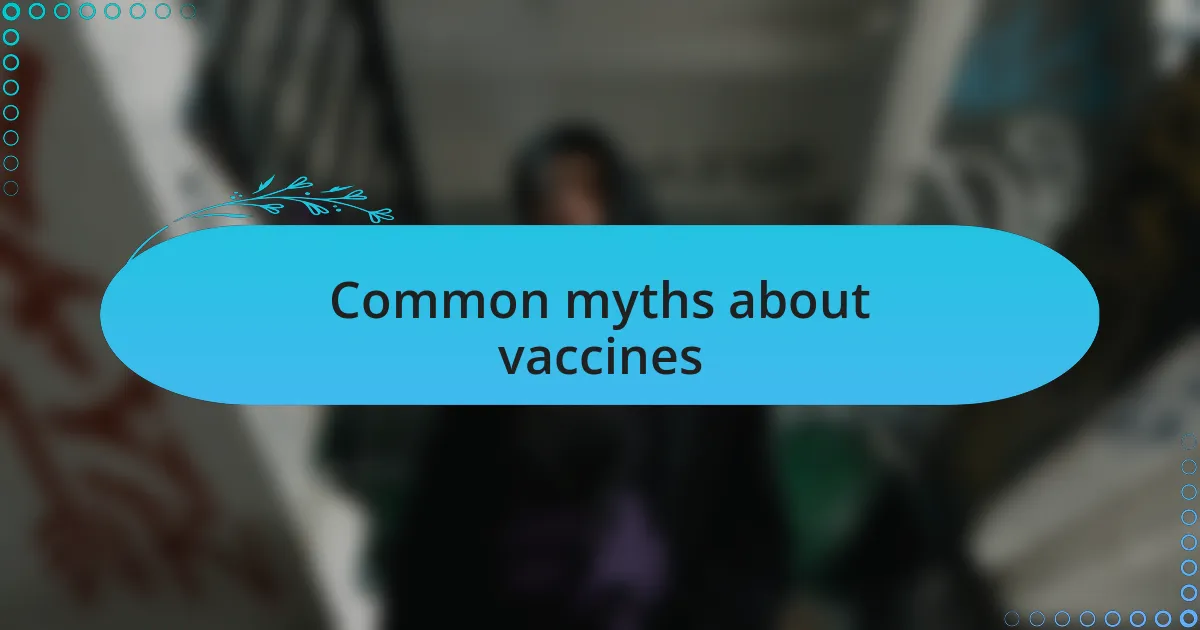
Common myths about vaccines
Vaccines are often surrounded by myths, one of the most persistent being that they cause the diseases they’re designed to prevent. I once had a heated conversation with a family member who firmly believed that the flu shot could actually give you the flu. I explained how vaccines work by stimulating the immune system without causing the disease itself, but their skepticism remained. Isn’t it fascinating how misinformation can overshadow scientific evidence?
Another common myth is the idea that vaccines aren’t necessary because diseases are rare. From my perspective, this misconception ignores the power of vaccination in controlling outbreaks. I’ve seen how, in communities with low vaccination rates, diseases can resurface, putting vulnerable individuals at risk. Have you ever thought about how a single vaccination can protect not just you, but also those who can’t be vaccinated due to medical conditions?
Lastly, some people believe that vaccines contain harmful substances that can lead to severe health issues. I recall reading a blog post that exaggerated the risks related to vaccine preservatives. It reminded me of the importance of understanding how these substances are tested for safety and efficacy. Wouldn’t it be more constructive to focus on the overwhelming evidence supporting vaccine safety? When I reflect on these myths, I’m motivated to share credible information to help dismantle them and foster a more informed public.
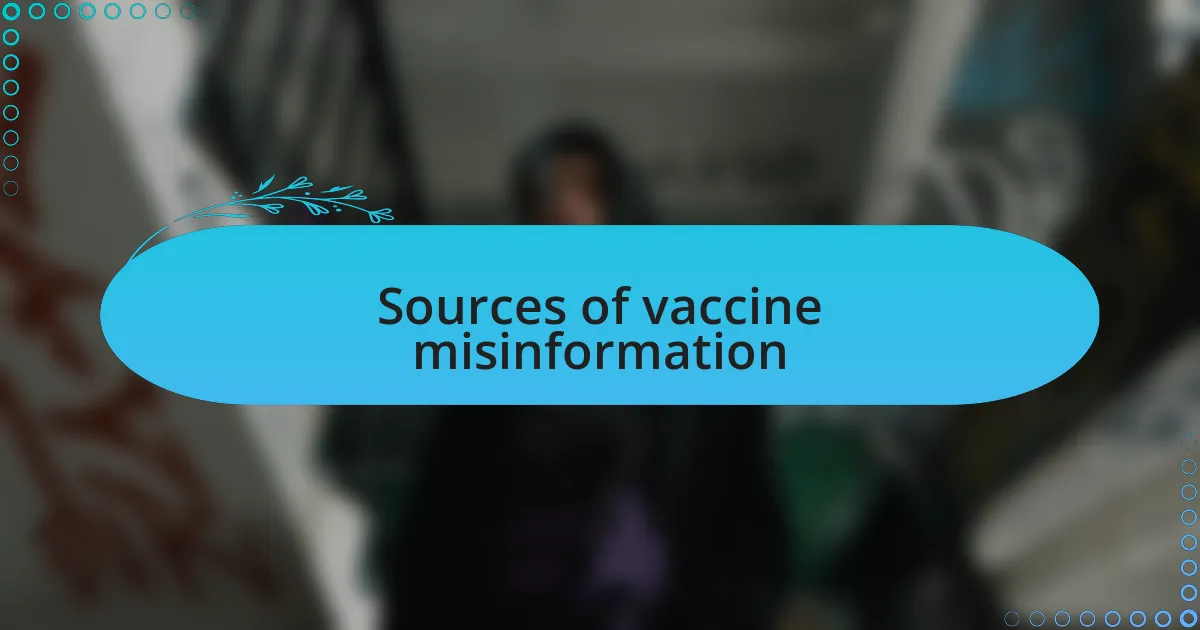
Sources of vaccine misinformation
Many sources contribute to the spread of vaccine misinformation, and they often thrive in the age of social media. I remember scrolling through my own feeds and encountering friends sharing questionable articles claiming vaccines are linked to autism. It’s disheartening to see how easily misinformation can spread. Have you noticed how something that seems credible at first glance can take off, even when it lacks scientific backing?
Another significant source lies in the echo chambers created by online forums and groups, where anti-vaccine rhetoric circulates unchecked. In my experience, participating in these discussions can sometimes feel like shouting into a void. People reinforce each other’s misconceptions without realizing the potential harm they’re causing. How often do we stop to question the sources of the information we’re consuming? To foster meaningful conversations, I believe we must encourage critical thinking about where our information is sourced.
Moreover, fear is a powerful motivator that drives people towards misinformation. A friend once shared how she was terrified after reading an opinion piece that claimed vaccines would lead to long-term health problems. While it’s understandable to have fears, I often think about how much more reassuring it would be if we focused on the robust research that underscores vaccine safety. Isn’t it time we channel our fears into seeking out reliable facts rather than amplifying the myths that frighten us?
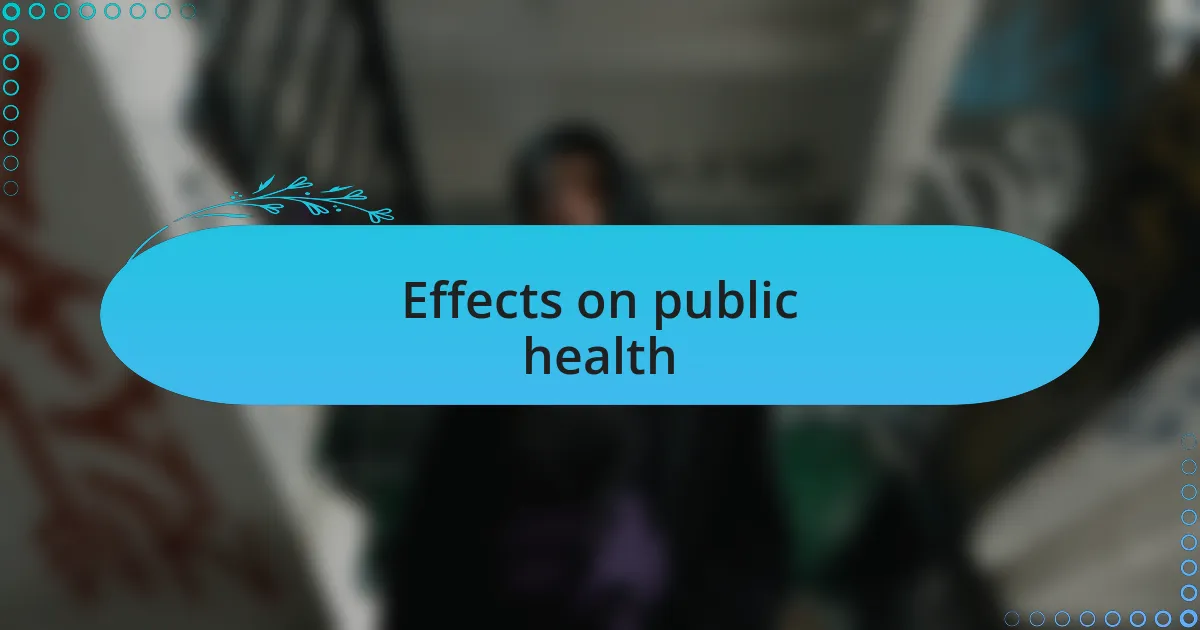
Effects on public health
The spread of vaccine misinformation significantly undermines public health initiatives. I’ve observed communities that were once enthusiastic about vaccination increasingly hesitant after exposure to inaccurate claims. The ripple effect is alarming; when individuals refuse vaccines, not only are their own health and safety at risk, but they also endanger those who cannot be vaccinated due to medical reasons. Does anyone truly benefit when misinformation convinces a parent to forgo immunizing a child?
When people distrust vaccines, it leads to lower immunization rates and, consequently, the resurgence of preventable diseases. A few months ago, I came across a local outbreak of measles, a disease that, through widespread vaccination, had nearly been eradicated. This made me reflect on how quickly our progress can be undone. It’s critical to consider: what are the broader implications for our healthcare systems when misinformation breeds outbreaks we thought we had under control?
Moreover, public health messaging struggles to compete with the emotional pull of misinformation. I often find myself frustrated when discussing vaccines with friends who have fallen victim to sensationalized stories. The challenge is not just presenting facts; it’s about addressing their fears and emotions. How can we change the narrative and emphasize the importance of vaccines without dismissing genuine concerns? Engaging in empathetic discussions is essential if we aim to bridge the gap created by misinformation.
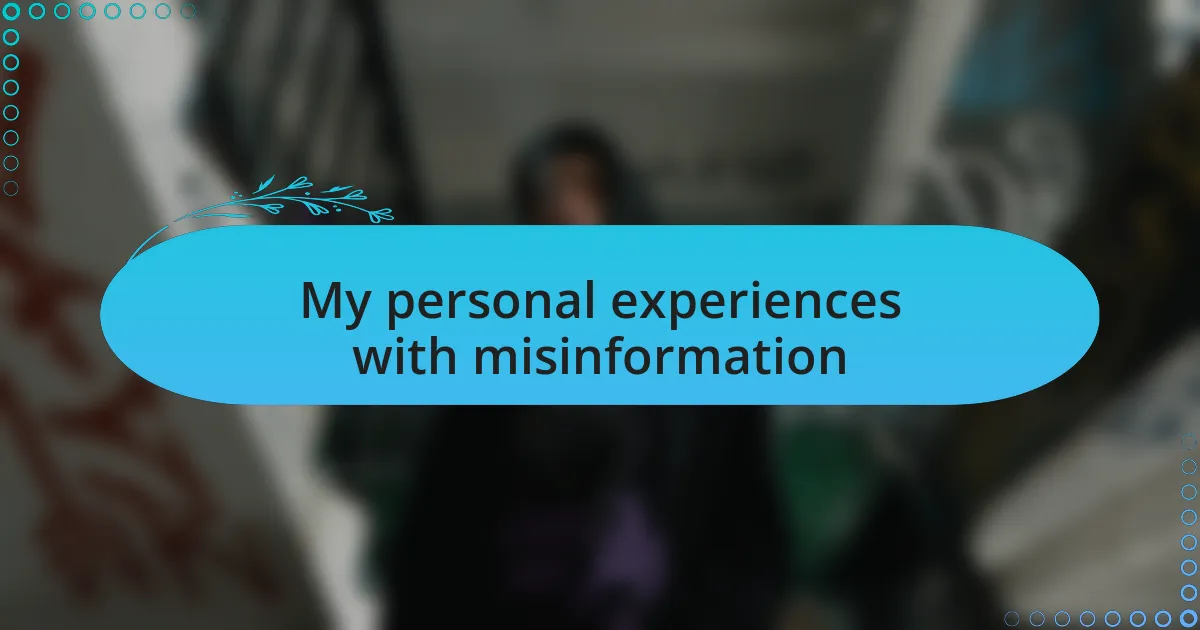
My personal experiences with misinformation
I can vividly remember a conversation with a close family member who was convinced that vaccines were harmful. It was tough to see someone I cared about fall prey to misinformation. I tried to share credible sources and scientific data, but the more I talked, the deeper their skepticism seemed to grow. This experience made me wonder: how often do people choose beliefs over facts, especially when fear is involved?
There was an incident during a community health fair where a well-known local influencer spread misinformation about vaccine side effects. I recall witnessing firsthand how it shifted the mood in the room. People went from eager to hesitant almost instantly. It struck me how quickly confidence can be shaken by a few misguided words. As someone deeply invested in public health, I couldn’t help but feel a mix of frustration and sadness—why is it so easy to spread fear rather than facts?
Reflecting on these moments, I’ve realized how critical it is to approach conversations about vaccines with empathy and understanding. I often ask myself: what stories will resonate more with someone who is uncertain—statistics or personal stories? I find that sharing my own experiences with vaccines often fosters a more open dialogue. It’s essential to connect on a human level, to show understanding while gently steering the conversation back to the truth, creating a safe space for questions and fears.